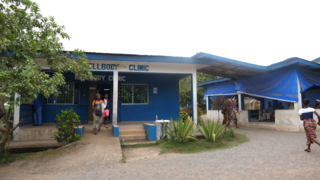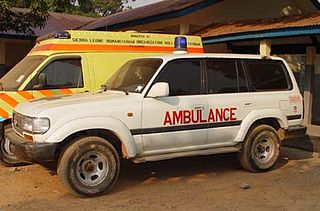Emergency is a humanitarian NGO that provides free medical treatment to the victims of war, poverty, and landmines. It was founded in 1994. Gino Strada, one of the organization's co-founders, served as EMERGENCY's Executive Director. It operates on the premise that access to high-quality healthcare is a fundamental human right.
International Medical Corps is a global, nonprofit, humanitarian aid organization that provides emergency medical services, healthcare training and capacity building to those affected by disaster, disease or conflict." It seeks to strengthen medical services and infrastructure in the aftermath of crises."

Wellbody Alliance is a 501(c)(3) registered nonprofit organization working to provide healthcare as a human right in Kono District, Sierra Leone. In addition to running a primary care facility, Wellbody operates a women's center and will open a birth center in 2015. They also focus on the prevention and treatment of HIV/AIDS and tuberculosis and provide medical services to amputee victims from the 11-year Sierra Leone Civil War. Their response effort during the Ebola virus epidemic in West Africa has received widespread media attention. These efforts include supporting four treatment facilities in rural Kono, house-to-house contract tracing and surveillance, the large-scale distribution of protective gear throughout Sierra Leone and an emphasis on sensitive community engagement to help stop the spread of the virus.
As of 24 September 2012, a cholera outbreak in Sierra Leone had caused the deaths of 392 people. It was the country's largest outbreak of cholera since first reported in 1970 and the deadliest since the 1994–1995 cholera outbreak. The outbreak has also affected Guinea, which shares a reservoir near the coast. This was the largest cholera outbreak in Africa in 2012.

The 2013–2016 epidemic of Ebola virus disease, centered in Western Africa, was the most widespread outbreak of the disease in history. It caused major loss of life and socioeconomic disruption in the region, mainly in Guinea, Liberia and Sierra Leone. The first cases were recorded in Guinea in December 2013; later, the disease spread to neighbouring Liberia and Sierra Leone, with minor outbreaks occurring in Nigeria and Mali. Secondary infections of medical workers occurred in the United States and Spain. In addition, isolated cases were recorded in Senegal, the United Kingdom and Italy. The number of cases peaked in October 2014 and then began to decline gradually, following the commitment of substantial international resources.

Healthcare in Sierra Leone is generally charged for and is provided by a mixture of government, private and non-governmental organizations (NGOs). There are over 100 NGOs operating in the health care sector in Sierra Leone. The Ministry of Health and Sanitation is responsible for organizing health care and after the end of the civil war the ministry changed to a decentralized structure of health provision to try to increase its coverage.

An Ebola virus epidemic in Sierra Leone occurred in 2014, along with the neighbouring countries of Guinea and Liberia. On 18 March 2014, Guinean health officials announced the outbreak of a mysterious hemorrhagic fever "which strikes like lightning". It was identified as Ebola virus disease and spread to Sierra Leone by May 2014. The disease was thought to have originated when a child from a bat-hunting family contracted the disease in Guinea in December 2013.

An epidemic of Ebola virus disease occurred in Liberia from 2014 to 2015, along with the neighbouring countries of Guinea and Sierra Leone. The first cases of virus were reported by late March 2014. The Ebola virus, a biosafety level four pathogen, is an RNA virus discovered in 1976.

Four laboratory-confirmed cases of Ebola virus disease occurred in the United States in 2014. Eleven cases were reported, including these four cases and seven cases medically evacuated from other countries. The first was reported in September 2014. Nine of the people contracted the disease outside the US and traveled into the country, either as regular airline passengers or as medical evacuees; of those nine, two died. Two people contracted Ebola in the United States. Both were nurses who treated an Ebola patient; both recovered.

Organizations from around the world responded to the West African Ebola virus epidemic. In July 2014, the World Health Organization (WHO) convened an emergency meeting with health ministers from eleven countries and announced collaboration on a strategy to co-ordinate technical support to combat the epidemic. In August, they declared the outbreak an international public health emergency and published a roadmap to guide and coordinate the international response to the outbreak, aiming to stop ongoing Ebola transmission worldwide within 6–9 months. In September, the United Nations Security Council declared the Ebola virus outbreak in the West Africa subregion a "threat to international peace and security" and unanimously adopted a resolution urging UN member states to provide more resources to fight the outbreak; the WHO stated that the cost for combating the epidemic will be a minimum of $1 billion.

In 2014, Ebola virus disease in Spain occurred due to two patients with cases of the disease contracted during the Ebola virus epidemic in West Africa; they were medically evacuated. A failure in infection control in the treatment of the second patient led to an isolated infection of Ebola virus disease in a health worker in Spain itself. The health worker survived her Ebola infection, and has since been declared infection-free.

This article covers the timeline of the 2014 Ebola virus epidemic in West Africa and its outbreaks elsewhere. Flag icons denote the first announcements of confirmed cases by the respective nation-states, their first deaths, and their first secondary transmissions, as well as relevant sessions and announcements of agencies such as the World Health Organization (WHO), the U.S. Centers for Disease Control (CDC), and NGOs such as Doctors Without Borders; medical evacuations, visa restrictions, border closures, quarantines, court rulings, and possible cases of zoonosis are also included.
The following lists events that happened during 2014 in Sierra Leone.

The Ebola virus epidemic in West Africa has had a large effect on the culture of most of the West African countries. In most instances, the effect is a rather negative one as it has disrupted many Africans’ traditional norms and practices. For instance, many West African communities rely on traditional healers and witch doctors, who use herbal remedies, massage, chant and witchcraft to cure just about any ailment. Therefore, it is difficult for West Africans to adapt to foreign medical practices. Specifically, West African resistance to Western medicine is prominent in the region, which calls for severe distrust of Western and modern medical personnel and practices.(see Ebola conspiracies below.)

Ebola virus disease in the United Kingdom has occurred rarely in four cases to date, namely three health workers returning from treating victims of the Ebola virus epidemic in West Africa in 2014 and 2015, and a single case in 1976, when a laboratory technician contracted the disease in a needlestick injury while handling samples from Africa. All cases recovered. As of 2022, no domestic transmission of Ebola has occurred in the United Kingdom.

Kerry Town is a village in the Rural District in the Western Area of Sierra Leone. the town is located about 31 kilometres (19 mi) from the national capital, Freetown, which lies to the west-north-west. The population of Kerry Town is largely from the Krio ethnic group. The Treatment of the Ebola Virus clinic is located in Kerry Town.
Pauline Cafferkey is a Scottish nurse and aid worker who contracted Ebola virus disease in 2014 while working in Sierra Leone as part of the medical aid effort during the West African Ebola virus epidemic. She survived the illness.

Cases of the Ebola virus disease in Nigeria were reported in 2014 as a small part of the epidemic of Ebola virus disease which originated in Guinea that represented the first outbreak of the disease in a West African country. Previous outbreaks had been confined to countries in Central Africa.

There is no cure or specific treatment for the Ebola virus disease that is currently approved for market, although various experimental treatments are being developed. For past and current Ebola epidemics, treatment has been primarily supportive in nature.
International Mutual Aid (IMA) is a Maryland 501(c)(3) registered nonprofit organization working to provide disaster and emergency medical assistance to underserved populations outside of the US.














